#zutara antis
Text
Zutara Antis Don't Know What a Toxic Relationship Actually Is
I just saw a Vegebul fan Tumblr user say that Vegebul can't be compared to Zutara because Zutara is toxic and Bulma was not trying to fix Vegeta🤡
As a Vegebul fan, I will proudly say without shame that this Tumblr user is an idiot with no brain. I am tired of seeing stupidity on Tumblr. In what world can you say that Zutara is toxic yet spew nonsense that Vegebul of all DBZ ships is healthier! Vegeta is the same man who was willing to let his baby mama and infant son die and nearly killed his wife when he decided family life was making him too soft in the Buu saga. Zuko was never the level of villain Vegeta was and never treated Katara that badly even when he was her effing enemy!!! 🤡
When has Vegeta ever supported Bulma the way Zuko supported Katara???
Unlike Bulma, Katara WOULD NEVER get with Zuko and spread her legs while he was still an antagonist and wanted to capture Aang!
Katara would never get with a guy who threatened to kill her and showed no sign of remorse either!!!
As for Bulma was not trying to fix Vegeta...so true! She gave him free housing, free food, free training equipment and free sex while he was still an egotistical bastard! She never calls him out for his horrible behaviour (eg. letting Cell become perfect and attacking her future son) or being a less-than-decent dad for Trunks. What a woman!
When has Vegeta ever shown any on-screen attempts to reconcile with Bulma for his hurtful actions? Unlike Vegeta, Zuko had to work for it! On-screen!!! For all of us to see Katara chew him out!!!
🤡🤡🤡🤡🤡🤡🤡🤡🤡🤡🤡🤡🤡🤡🤡🤡🤡🤡🤡🤡🤡🤡
Every day I am amazed at Zutara antis who call Zutara toxic. Here is a guy who wronged and hurt a girl in the past that:
redeems himself and atones
proactively works to earn her forgiveness
provides emotional support and lets her be emotionally vulnerable
willing to be emotionally open with her
never lashes out even when she attacks him
sacrifices himself for her
works hard to redeem his nation that oppressed her people
genuinely cares about her and believes in her abilities
actively befriends and makes amends with all her loved ones whom he also hurt (which includes a possible love interest)
ALL ON SCREEN! No hand-waving his past hurtful actions or having character relationship development off-screen. No enabling of bad behaviour. Vegebul needed almost ten years to be a truly healthy relationship. Zuko only needed a few episodes for him and Katara to become great friends. Zutara >>> Vegebul.
In what world is this TOXIC?? Sounds pretty healthy to me! I want a Zuko for a husband (minus the enemy part lol). Who would choose Vegeta over Zuko for a love interest?? Well, I guess some people dig deadbeat husbands ;)

Both Vegebul and Zutara started off on bad terms and both shows ended with both pairs having a great relationship. The difference is that Vegebul began as a toxic relationship vs Zutara having a healthy dynamic once they became friends when Katara forgave Zuko. Zutara never had any romantic dealings while they were enemies. And even when Katara was rightfully antagonistic towards Zuko, Zutara treated each other better than Vegeta did Bulma. Just compare Katara saving a falling Zuko vs Vegeta who did nothing to save Trunks and Bulma.
#zutara antis#zutara#atla zuko#katara#atla#zuko x katara#katara deserved better#pro zutara#anti dumb vegebul stans#out here calling zutara toxic while glorifying vegebul!#sick and tired of vegebul foolishness#dbz vegeta#bulma briefs#vegebul critical#anti anti zutara#i love post buu saga vegebul the most but stop acting like toriyama showed vegebul as some epic romance#hardly any meaningful vegebul moments in dbz#that's probably why yamcha's death has a heartwarming montage while all vegeta got was bulma screaming#the best vegebul moments happen when bulma and vegeta are apart for goodness sakes!#i don't care about dbs so no one come at me about that trash show#salty rant#bulma briefs critical#vegeta critical#zutara supremacy
54 notes
·
View notes
Text
I just watched Avatar for the first time all the way through, and yeah, it’s great, but the one thing that surprised me was how different Katara was compared to the fandom interpretation I’d seen and internalized before watching.
Like, before you watch Avatar, you’ve seen all these memes about Katara and her mom, and based on those memes, you assume it’s one of those lines you have to get used to hearing at least once every episode. But then you watch the show and realize that she only talks about her mom maybe five or six times per season and you also realize she only brings her up when she’s trying to comfort someone or empathize with them because that’s how she processes her grief and that’s one way she connects with people.
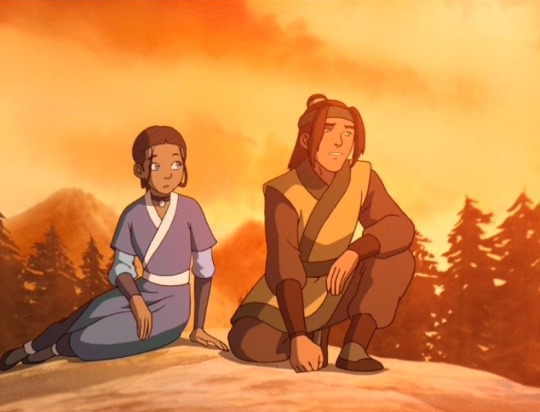
Or you hear the infamous line, “then you didn’t love [our mother] the way I did” and you prepare yourself for one of the worst character assassinations ever only to see the scene after nearly three seasons worth of context and realize she was kinda right. She’s been the mother, the nurturer, the comforter. She’s been patient, gentle, and accommodating where everyone else has gotten to be insensible and reckless and childish, and the one moment where she allows herself to feel her grief, suddenly she’s this evil bitch and not, y’know, a 14 year old girl whose been thrusted into adulthood in a way no other character has. A 14 year old girl who should be allowed immaturity and raw emotion and anger instead of the patience and grace she’s been forced to extend to every character without even the smallest amount of gratitude or even consideration in return.
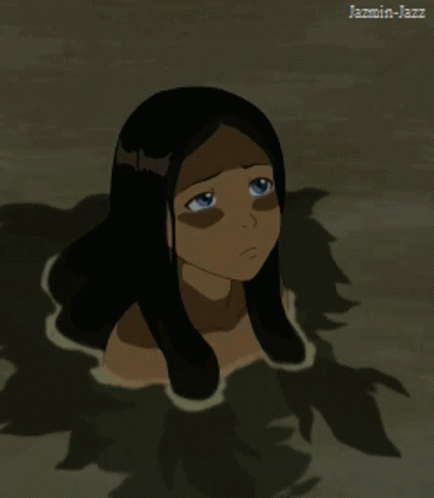
Or you see all of the clips where Katara puts Aang in the “friendzone” and you expect to have this wishy washy back and forth where Aang is putting his feelings out there only to have Katara neither commit nor express any clear reciprocation or rejection. Then you watch and realize that, as cute as the ship is initially, that there’s never a point where Aang returns any comfort or grace to Katara despite her always doing this for him to the point of coddling. That for as much as Aang says he loves her, he never seems to outgrow his perception of her so he can recognize her as someone who feels grief, anger, and pain as much as she expresses love, kindness, and maturity. And instead of having moments where he learns to see her beyond her strength or compassion, you’re instead given moments where Aang forces his feelings onto her, both romantic and non-romantic, and Katara is expected to just…shoulder those feelings the way she shoulders everyone else’s.
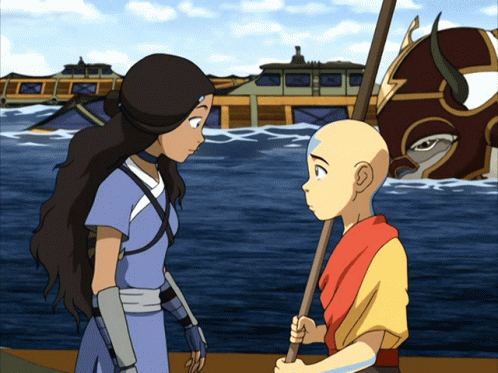
Katara is the most misunderstood character in the show. As much as people recognize the complexities of Zuko, Sokka, and Azula, they struggle to do the same for Katara because they see her struggles as somehow lesser, and therefore, less deserving of sympathy. They can handle her so long as she’s being endlessly patient and loving and kind, but the moment her endless love, patience, and kindness runs out, she’s suddenly this annoying bitch who can’t shut up about her mother or reciprocate Aang’s feelings. But Katara’s trauma does matter as much as anyone else’s. No, she wasn’t banished from her kingdom. No, she didn’t lose her entire community, and no, she isn’t the only one who lost her mother. But the difference between her and everyone else whose experienced loss because of the Fire Nation is that she’s never given time to process her trauma. Aang gets to lean on Katara constantly. Toph gets to express her feelings to Katara, and yeah, Sokka also lost their mother, but unlike Katara, he isn’t put in the position of being a substitute for everyone’s parent. He even admits that he sees his sister as a mother. The only characters who ever comfort Katara or allow her to vent is Zuko and her father and that’s, like, three scenes in a show where the other characters are consistently given opportunities to seek out Katara for unconditional support.
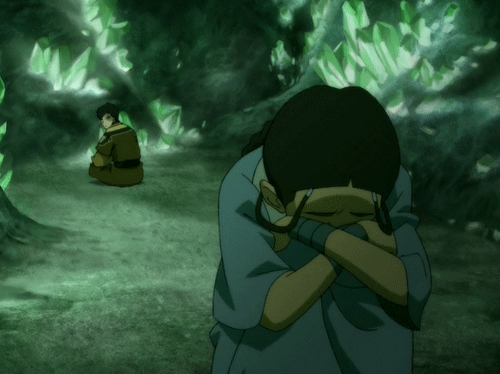
The fandom interpretation of Katara has been so bastardized that even those who haven’t watched the show know her for this fanon version and not for who she is. She’s such an interesting character beyond her fandom limitations, though. She’s brave, hot-headed, and hopeful as well as gentle and caring. She wishes to learn waterbending, not only because she wants to fight in the war, but because she wants to continue her culture’s practices because, and people often forget this, she also lost an entire subculture within her already fractured tribe. And she wants to defeat the Fire Nation both because of her deep love and empathy for other people, but also because she wants to avenge her mother. But because some of the fans have reduced Katara to a bitch who constantly whines about her mother and friendzones Aang, you wouldn’t know any of this, and it sucks because she’s the only character whose been dumbed down to such an extent.
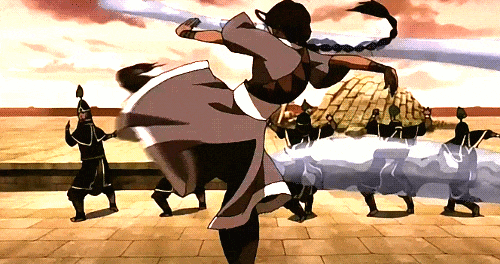
#avatar the last airbender#avatar#katara#you can tell she’s my favorite character#female character#zutara#I’m not anti or pro either#just something I noticed#I’m not against Aang either#just this writing
23K notes
·
View notes
Text
Ugh I will always love the concept of Katara using blood bending to revive Zuko after the last agni kai, mostly because it makes no sense to me that Zuko was able to bounce back so easily after being struck by lightning, but also because the way the show treats bloodbending is just odd to me. It was a defense mechanism created by a traumatized victim of some of the most devastating parts of colonization, and although I understand that Hama was supposed to symbolize the "bad parts" of waterbending and was important for Katara's growth in realizing that the world isn't entirely black and white, its still disappointing to me that the show never explored the gray areas of blood bending, especially since that episode was, as I stated above, about understanding the gray areas of the war. Katara using blood bending to revive Zuko would add so much to the last agni kai in demonstrating that she has truly realized that "good" and "evil" are relative concepts, and Zuko being saved by both a defense mechanism of a survivor of colonialism and a type of bending used to terrorize his people would have even added to his arc, as the narrative required him to save and subsequently be saved by the physical embodiment of everything his family sought to annihilate.
#also just the angst potential#there are so many fics and better metas written about this but I had to throw my two cents in#Bryke's refusal to acknowledge bloodbending as anything but evil incarnate is so fucking annoying#anti bryke#bloodbending#zutara#zuko#katara#final agni kai#atla#avatar the last airbender#atla meta#zutara meta#technically
4K notes
·
View notes
Text
I love Zutara as much as the next girlie, but I think people romanticizing Zuko catching Azula's lightning in the Final Agni Kai are doing Zuko's character a massive disservice. He would have done that for anyone. Not just anyone in the Gaang, anyone.
He did it for the division he ended up getting burned over. He did it for his subordinate that was going to fall to his death after the ship was struck by lightning. He did it for Lee, when he was kidnapped by Gao. He did it for Iroh, when he confronted his dad and tried to break him out of prison. He did it for the whole Gaang at the Western Air Temple. He did it for Sokka, Suki, and Hakoda at the Boiling Rock.
His whole character revolves around saving everyone else first. Hell, he tried to save Zhao of all people! There's no way that would have gone well for Zuko if Zhao had actually taken his hand. He always does what he thinks is right first before considering his own safety.
Zuko always saves other people. Even if, especially if, he can't save himself.
#look i love zutara#but zuko has no conception of personal safety#there are better zutara moments in atla!!!!#like i will absolutely still read fanfic that romanticizes that scene#but it still would have happened if literally anyone else had been standing there#zutara#zutara criticism#i'm going to tag this as#anti zutara#just in case someone doesn't want to see a critique of the ship#i'm not really critiquing the ship#but out of an abundance of caution#uh actual antis if you see this: behave yourselves lol#zuko#avatar the last airbender#atla
4K notes
·
View notes
Text
"Zuko would take a lightning for anyone–"
But it was Katara that he chose to invite.
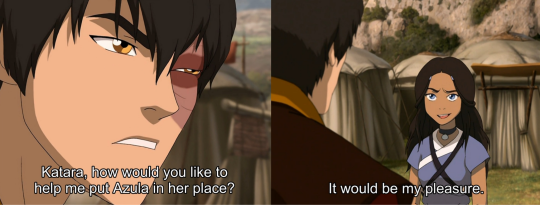
"Zuko would take a lightning for anyone–"
But Azula knew to aim at Katara.

"Zuko would take a lightning for anyone–"
But the scene was romamtically coded.
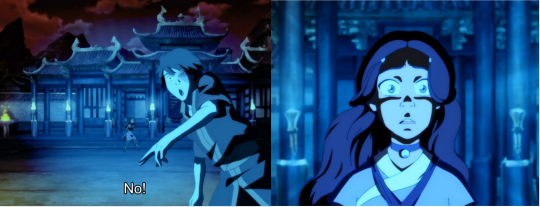
"Zuko would take a lightning for anyone–"
But Katara needed to get to heal him.
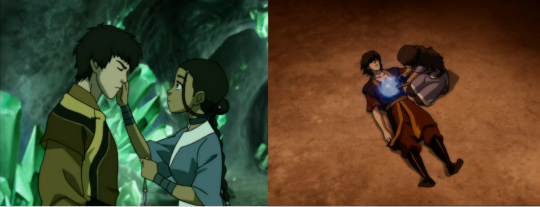
"Zuko would take a lightning for anyone–"
But it was Katara who was with him in season finales.
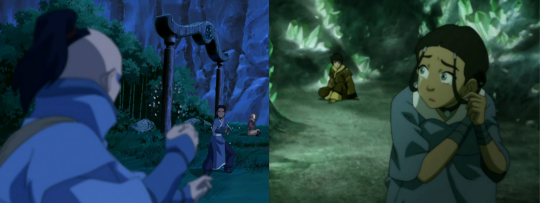
"Zuko would take a lightning for anyone–"
But he needed to choose Katara over Azula.

"Zuko would take a lightning for anyone–"
But Shu needed to survive in this life.
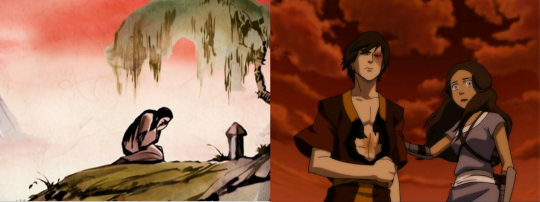
"Zuko would take a lightning for anyone–"
But the writers deliberately chose Katara.
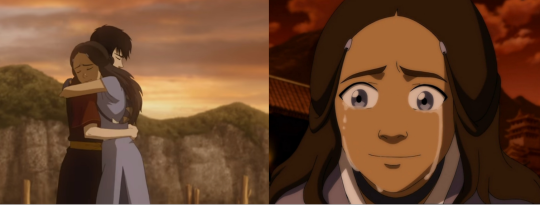
Inspired by @captain-konami-code 's "They were enemies"
#DISCLAIMER: I know this post isn't a full convincing argument. It's more for people who already agree.#it *definitely* falls under shitpost#zutara shitpost#<- the true nature of the post#zutara meta#<- for exposure#zutara#anti anti zutara#pro zutara#zuko x katara#katara x zuko#zukoxkatara#kataraxzuko#zutara analysis#zutara evidence#zutara forever#zutara nation#zutara was robbed#zutara supremacy#zutara should have been canon#atla critical#atla critisism#katara#zuko#prince zuko#katara of the southern water tribe
3K notes
·
View notes
Text
I think that one of the reasons I hate zutara and I like zukka is because the zukka fandom is pretty much the opposite of the zutara fandom.
I've never ever seen a post where someone tries to prove that zukka should've been canon or that it IS canon. Zutara shippers take every scene between the two and over analyze everything to the point that it's exhausting and annoying.
Zukka shippers don't do that, and most of the fandom is just like, "Haha, what if these two kissed?" And honestly, I love that sm more than the over analyzing
2K notes
·
View notes
Text
Katara's Story Is A Tragedy and It's Not An Accident
I was a teenaged girl when Avatar: The Last Airbender aired on Nickelodeon—the group that the show’s creators unintentionally hit while they were aiming for the younger, maler demographic. Nevermind that we’re the reason the show’s popularity caught fire and has endured for two decades; we weren’t the audience Mike and Bryan wanted. And by golly, were they going to make sure we knew it. They’ve been making sure we know it with every snide comment and addendum they’ve made to the story for the last twenty years.
For many of us girls who were raised in the nineties and aughts, Katara was a breath of fresh air—a rare opportunity in a media market saturated with boys having grand adventures to see a young woman having her own adventure and expressing the same fears and frustrations we were often made to feel.
We were told that we could be anything we wanted to be. That we were strong and smart and brimming with potential. That we were just as capable as the boys. That we were our brothers’ equals. But we were also told to wash dishes and fold laundry and tidy around the house while our brothers played outside. We were ignored when our male classmates picked teams for kickball and told to go play with the girls on the swings—the same girls we were taught to deride if we wanted to be taken seriously. We were lectured for the same immaturity that was expected of boys our age and older, and we were told to do better while also being told, “Boys will be boys.” Despite all the platitudes about equality and power, we saw our mothers straining under the weight of carrying both full-time careers and unequally divided family responsibilities. We sensed that we were being groomed for the same future.
And we saw ourselves in Katara.
Katara begins as a parentified teenaged girl: forced to take on responsibility for the daily care of people around her—including male figures who are capable of looking after themselves but are allowed to be immature enough to foist such labor onto her. She does thankless work for people who take her contributions for granted. She’s belittled by people who love her, but don’t understand her. She’s isolated from the world and denied opportunities to improve her talents. She's told what emotions she's allowed to feel and when to feel them. In essence, she was living our real-world fear: being trapped in someone else’s narrow, stultifying definition of femininity and motherhood.
Then we watched Katara go through an incredible journey of self-determination and empowerment. Katara goes from being a powerless, fearful victim to being a protector, healer, advocate, and liberator to others who can’t do those things for themselves (a much truer and more fulfilling definition of nurturing and motherhood). It’s necessary in Katara’s growth cycle that she does this for others first because that is the realm she knows. She is given increasingly significant opportunities to speak up and fight on behalf of others, and that allows her to build those advocacy muscles gradually. But she still holds back her own emotional pain because everyone that she attempts to express such things to proves they either don't want to deal with it or they only want to manipulate her feelings for their own purposes.
Katara continues to do much of the work we think of as traditionally maternal on behalf of her friends and family over the course of the story, but we do see that scale gradually shift. Sokka takes on more responsibility for managing the group’s supplies, and everyone helps around camp, but Katara continues to be the manager of everyone else’s emotions while simultaneously punching down her own. The scales finally seem to tip when Zuko joins the group. With Zuko, we see someone working alongside Katara doing the same tasks she is doing around camp for the first time. Zuko is also the only person who never expects anything of her and whose emotions she never has to manage because he’s actually more emotionally stable and mature than she is by that point. And then, Katara’s arc culminates in her finally getting the chance to fully seize her power, rewrite the story of the traumatic event that cast her into the role of parentified child, be her own protector, and freely express everything she’s kept locked away for the sake of letting everyone else feel comfortable around her. Then she fights alongside an equal partner she knows she can trust and depend on through the story's climax. And for the first time since her mother’s death, the girl who gives and gives and gives while getting nothing back watches someone sacrifice everything for her. But this time, she’s able to change the ending because her power is fully realized. The cycle was officially broken.
Katara’s character arc was catharsis at every step. If Katara could break the mold and recreate the ideas of womanhood and motherhood in her own image, so could we. We could be powerful. We could care for ourselves AND others when they need us—instead of caring for everyone all the time at our own expense. We could have balanced partnerships with give and take going both ways (“Tui and La, push and pull”), rather than the, “I give, they take,” model we were conditioned to expect. We could fight for and determine our own destiny—after all, wasn’t destiny a core theme of the story?
Yes. Destiny was the theme. But the lesson was that Katara didn’t get to determine hers.
After Katara achieves her victory and completes her arc, the narrative steps in and smacks her back down to where she started. For reasons that are never explained or justified, Katara rewards the hero by giving into his romantic advances even though he has invalidated her emotions, violated her boundaries, lashed out at her for slights against him she never committed, idealized a false idol of her then browbeat her when she deviated from his narrative, and forced her to carry his emotions and put herself in danger when he willingly fails to control himself—even though he never apologizes, never learns his lesson, and never shows any inclination to do better.
And do better he does not.
The more we dared to voice our own opinions on a character that was clearly meant to represent us, the more Mike and Bryan punished Katara for it.
Throughout the comics, Katara makes herself smaller and smaller and forfeits all rights to personal actualization and satisfaction in her relationship. She punches her feelings down when her partner neglects her and cries alone as he shows more affection and concern for literally every other girl’s feelings than hers. She becomes cowed by his outbursts and threats of violence. Instead of rising with the moon or resting in the warmth of the sun, she learns to stay in his shadow. She gives up her silly childish dreams of rebuilding her own dying culture’s traditions and advocating for other oppressed groups so that she can fulfill his wishes to rebuild his culture instead—by being his babymaker. Katara gave up everything she cared about and everything she fought to become for the whims of a man-child who never saw her as a person, only a possession.
Then, in her old age, we get to watch the fallout of his neglect—both toward her and her children who did not meet his expectations. By that point, the girl who would never turn her back on anyone who needed her was too far gone to even advocate for her own children in her own home. And even after he’s gone, Katara never dares to define herself again. She remains, for the next twenty-plus years of her life, nothing more than her husband's grieving widow. She was never recognized for her accomplishments, the battles she won, or the people she liberated. Even her own children and grandchildren have all but forgotten her. She ends her story exactly where it began: trapped in someone else’s narrow, stultifying definition of femininity and motherhood.
The story’s theme was destiny, remember? But this story’s target audience was little boys. Zuko gets to determine his own destiny as long as he works hard and earns it. Aang gets his destiny no matter what he does or doesn’t do to earn it. And Katara cannot change the destiny she was assigned by gender at birth, no matter how hard she fights for it or how many times over she earns it.
Katara is Winston Smith, and the year is 1984. It doesn’t matter how hard you fight or what you accomplish, little girl. Big Brother is too big, too strong, and too powerful. You will never escape. You will never be free. Your victories are meaningless. So stay in your place, do what you’re told, and cry quietly so your tears don’t bother people who matter.
I will never get over it. Because I am Katara. And so are my friends, sisters, daughters, and nieces. But I am not content to live in Bryke's world.
I will never turn my back on people who need me. Including me.
#ATLA#Avatar the Last Airbender#Katara#Anti Bryke#Zutara#but not really#just pro-Katara#Anti Kataang
2K notes
·
View notes
Text

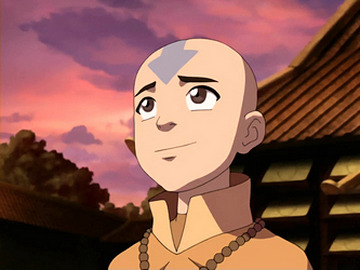
save me characters who are still hated and mischaracterized in 2024 for the sake of a fanon ship save meeeee
2K notes
·
View notes
Text
Something that I think ppl who ship both sukka and zutara don't acknowledge enough is the fact that poor Hakoda met both his kids' future spouses on the same day, in the same place and that place just happened to be prison.
#Hakoda: Wow Sokka's girlfriend is the imprisoned leader of an elite team of warriors surely it can't get more complicated now#*sees his daughter interacting for twenty-seconds with the exiled traitor prince of an enemy nation*#Hakoda: uh oh#those kids are the best 16 year migraine this man has ever had#my posts#zutara#sukka#zuko x katara#sokka x suki#wanted to put something fun in the zk tag since i've seen to many antis lurking in there#and i've got like half this fandom blocked already!
1K notes
·
View notes
Text
I’m sorry, but the Netflix showrunner referring to Kataang as an “issue to tackle” in the future is some of the funniest shit I’ve ever read/heard.
#the way I choked#he was directly referencing k@taang in his answer too.#the age gap was already a problem in the original show#now you just see it the way Zutara has the entire time because you see it in real life actors their age#the maturity difference between a 12 and 14 year old is insane#he literally said he was relieved he didn’t have to deal with it this season#and he just kept going too 😭#I’m not a fan of the ship but DAMN he did them so dirty#avatar the last airbender#zutara#atla live action#anti k@taang
2K notes
·
View notes
Text
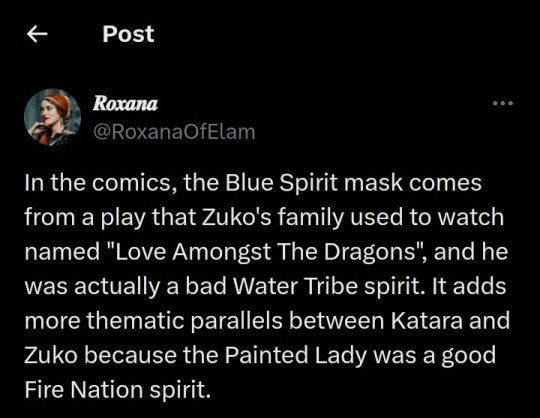
Zutara are parallels in every possible ways, yet they didn't end up together, and other shipper expect me to not upset about it?
2K notes
·
View notes
Text
They way certain people here want Katara to be a woman with no agency over her life and marriage, miserable, unhappy, abused and used as an incubator by the evil monk Aang....so sad.
She's a hero, powerful, the master of water bending, in love and happy :) And she’s loved and respected by Aang
If she was unhappy with Aang, she would have dropped his ass in 0.5 seconds. Yes the real Katara can do that, unlike your cinderella self insert
You all reducing one of the strongest, most interesting, and dynamically written characters in the show to misogynistic tropes and theories just because you don't like the boy she ended up with. You are literally making up things to be mad about. This is hilarious
Well you can stay mad forever lol

1K notes
·
View notes
Text
the anti-Zutara criticism that “Zutara shippers are teenage girls who only like the ship because they self-insert as Katara” is actually so funny because how does that delegitimize the ship? So…girls who relate to Katara like Zuko, and they think Katara would like Zuko, and that’s bad because…girls are wrong? Girls are shallow? Girls don’t know what’s good for them?
Anyway if I were a grown ass man who created a fictional teenage girl that lots of real teenage girls relate to, and these girls believe she would like character B instead of character A, I hope I’d have the humility to say to myself “hmm I wonder why people who relate to this character’s feelings and motivations think she would react this way” instead of jumping straight to “these girls are doomed to like toxic relationships”
(And I know Zutara shippers like the ship for many different reasons, and self-insert is not the most popular by a long shot, I’m just saying that the criticism of self-insert stems from dismissal of what teenage girls like, and that feels kinda misogynistic to me)
#Zutara#pro Zutara#anti bryke#katara#Anti kataang#not really anti kataang but tagging it just in case#I should tag this “pro teenage girls”#My meta
1K notes
·
View notes
Text
i will always hate that katara never came to terms with her bloodbending. especially given that it’s a symbolic representation of her own “darker” side, the fact that she was never able to find the good in it and accept it as just another aspect of her element, instead outlawing and demonizing it forever, makes me so sad because it perfectly encapsulates the person she herself ended up as: the shallow, shining trophy wife on aang’s arm, locking away everything he didn’t want and was never able to understand to become his perfect, flawless forever girl for the rest of her days.
and it’s so much more frustrating knowing that zuko — who knows exactly what it feels like to wield an element that can be destructive and violent, whose own arc about the duality of fire would have made him the perfect person to help katara understand that there is no such thing as inherently good or evil bending, only the bender who makes it so — was right there! yet instead of letting them have even one conversation about it, we got bloodbending being villainized till the heat death of the fucking universe and katara left forever unable to accept the complexity of her bending (and metaphorically, the complexity within herself) even though she had the exact person she needed right at hand to help and support her through the process… god it just drives me mad
2K notes
·
View notes
Text
"Zuko and Katara would argue all the time if they ever had a romantic relationship"
Are
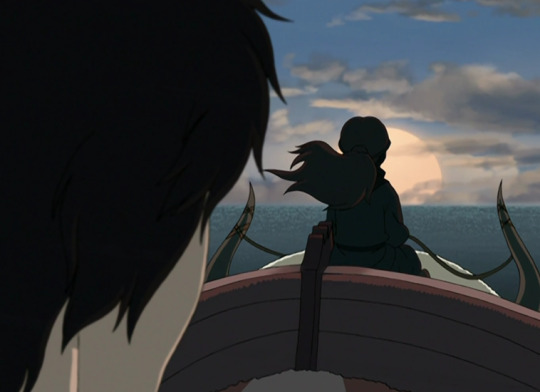
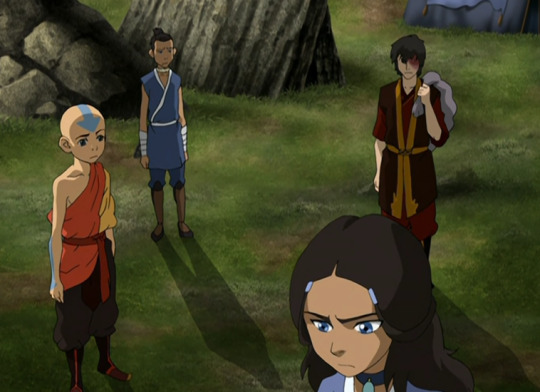
you
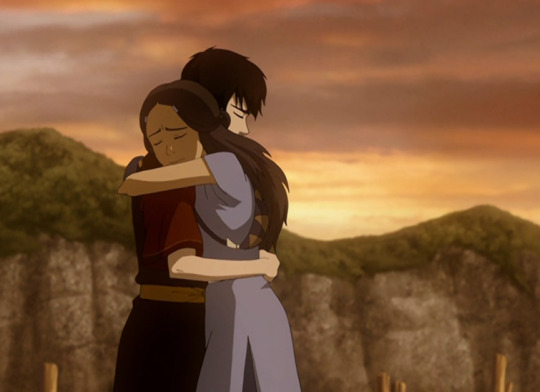

absolutely

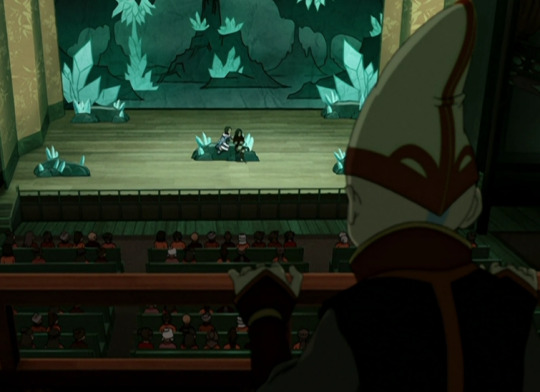
sure
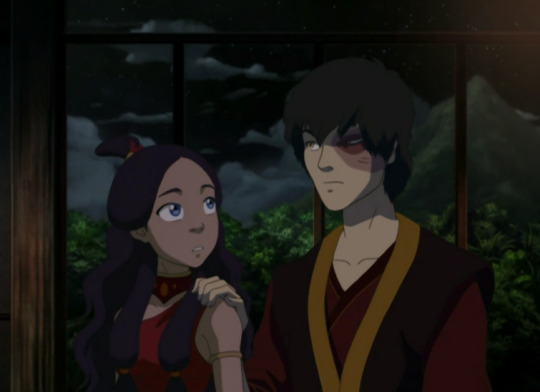
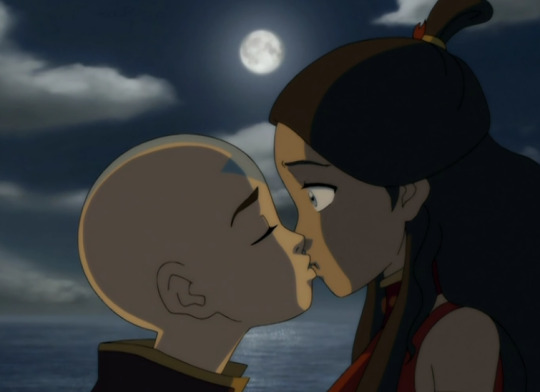
about
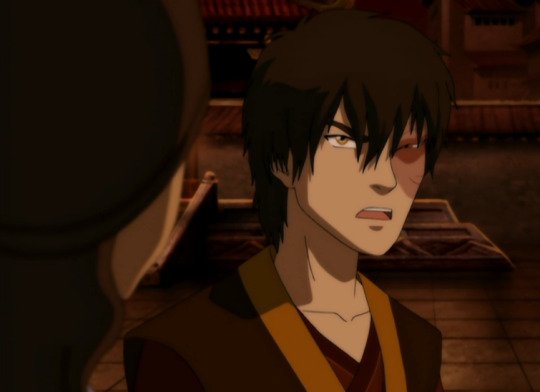
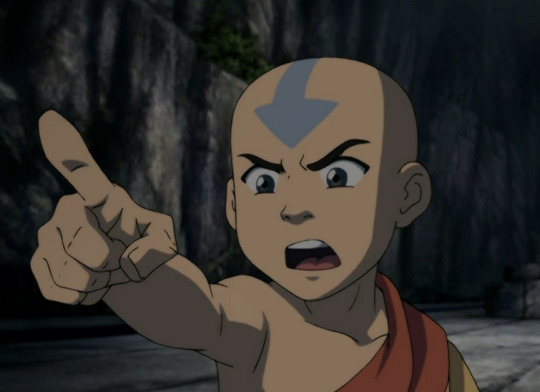
that?
#it seems to me like kataang are the only ones arguing here#except maiko is too so nvm#putting end of book three zutara interactions and end of book 3 kataang interactions side by side is actually eye opening#zutara#anti kataang#anti maiko#anti anti zutara#katara x zuko#zuko x katara#atla#avatar the last airbender
711 notes
·
View notes
Text
Look I know people love to act like Zuko is the most dangerous, toxic, and temperamental character… but there is exactly one (1) male character Katara was canonically responsible for calming down from violent, destructive tantrums at risk to herself and it wasn’t Zuko… 🐸☕️
#another overlooked toxic trope tbh#zutara#atla#zuko#katara#aang critical#anti kataang#canon critical
807 notes
·
View notes